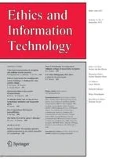Abstract
The purpose of this paper is to address the question of whethercomputer source code is speech protected by the First Amendmentto the United States Constitution or whether it is merelyfunctional, a ``machine'', designed to fulfill a set task andtherefore bereft of protection. The answer to this question is acomplex one. Unlike all other forms of ``speech'' computer sourcecode holds a unique place in the law: it can be copyrighted, likea book and it can be patented like a machine or process.Case law, intellectual property law and encryption exportregulations all reflect this contradictory dichotomy.
Similar content being viewed by others
Author information
Authors and Affiliations
Rights and permissions
About this article
Cite this article
Camp, J., Lewis, K. Code as speech: A discussion of Bernstein v. USDOJ, Karn v. USDOS, and Junger v. Daley in light of the U.S. Supreme Court's recent shift to Federalism. Ethics and Information Technology 3, 21–33 (2001). https://doi.org/10.1023/A:1011427806551
Issue Date:
DOI: https://doi.org/10.1023/A:1011427806551



